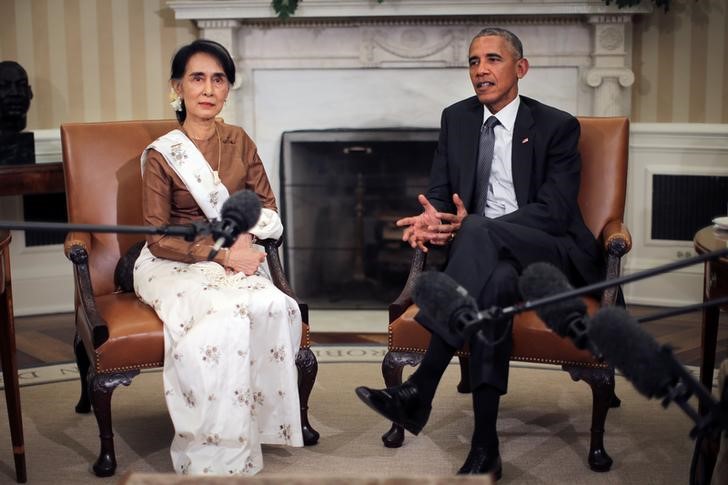Image: U.S. President Barack Obama meets with Myanmar’s State Counsellor Aung San Suu Kyi at the Oval Office of the White House in Washington, D.C., U.S. September 14, 2016. REUTERS/Carlos Barria
By Jeff Mason and Timothy Mclaughlin
WASHINGTON (Reuters) – Myanmar’s Aung San Suu Kyi called on Wednesday for the lifting of economic sanctions against her country, and President Barack Obama, in their first White House meeting since she became leader, said the United States was ready to do so.
“It is the right thing to do in order to ensure that the people of Burma see rewards from a new way of doing business and a new government,” Obama said with Suu Kyi sitting next to him in the Oval Office.
The trip by Suu Kyi, 71, who like Obama is a Nobel Peace Prize laureate, capped a decades-long journey from political prisoner to national leader after her party won a sweeping electoral victory last year.
With Suu Kyi no longer an opposition figure, the United States has been weighing a further easing of sanctions against Myanmar, formerly known as Burma, as Obama looks to normalize relations with a country Washington shunned when it was ruled by a military junta.
“We think that the time has now come to remove all the sanctions that hurt us economically,” Suu Kyi said, noting that the U.S. Congress had supported her country by backing sanctions in the past to apply pressure for democratic reforms.
As Suu Kyi arrived for the meeting, the White House issued a statement saying it would reinstate Myanmar to the Generalized System of Preferences, or GSP, which provides duty-free treatment for goods from poor and developing countries.
Myanmar was removed from GSP benefits in 1989 following pro-democracy uprisings a year earlier that were brutally suppressed by the ruling military junta. Myanmar will be back in the program on Nov. 13, U.S. officials said.
Reinstating those benefits, combined with the lifting of sanctions, “will give the United States, our businesses, our non-profit institutions greater incentive to invest and participate in what we hope will be an increasingly democratic and prosperous partner for us in the region,” Obama said.
For Obama to lift sanctions, he will need to issue an executive order ending the national emergency declaration on Myanmar, first issued in 1997, which underpins sanctions, and revoke previous country-related sanction orders.
A senior administration official said the removal of sanctions would not apply to military-to-military assistance.
The United States eased some sanctions against Myanmar earlier this year to support political reform but maintained most of its economic restrictions with an eye toward penalizing those it views as hampering the democratically elected government.
RIGHTS GROUP BACKLASH
The sanctions announcement drew swift condemnation from human rights groups, which said the move was made too quickly and forfeited remaining leverage on Myanmar’s military.
“Lifting restrictions on doing business with Burma’s military and its corporate enterprises, as well as the friends and cronies who been enriched by their decades of rule, is not the right thing to do,” said John Sifton, deputy Washington director at Human Rights Watch.
“It benefits largely them, and few others, and certainly not the people of Burma in general.”
A group of 46 non-governmental organizations circulated a letter they wrote to Obama on Monday expressing concern about easing sanctions on Myanmar while human rights abuses by the military and against Rohingya Muslims persisted.
“To lift sanctions prior to tangible change for suffering communities would be a disservice to those vulnerable peoples who deserve international protection,” it said.
Suu Kyi has been criticized by some rights groups for not doing enough to address the plight of the Rohingya. Some 125,000 Rohingya remain in temporary camps in Rakhine State in the west of the country following violence in 2012.
Under the country’s citizenship law, the Rohingya are not recognised as one of the country’s 135 official ethnic groups and are stateless. They are seen as illegal immigrants from neighbouring Bangladesh and deeply disliked by many in Myanmar, particularly Rakhine Buddhists.
“We want to make sure that everybody who is entitled to citizenship is accorded citizenship as quickly and as fairly as possible. This is what we are trying to do in Rakhine,” Suu Kyi said.
On Wednesday, U.S. Senator Bob Corker, chairman of the Senate Foreign Relations Committee, criticized what he described as Suu Kyi’s “dismissive” reaction to concerns he had raised about her country’s record on human trafficking.
“After witnessing her lack of regard for Burma’s dismal track record on this issue, I plan to pay very close attention to her government’s efforts to prevent innocent human beings from being trafficked and sold into forced labour and sex slavery,” the Republican lawmaker said in a statement released to Reuters after a breakfast meeting with Suu Kyi and Vice President Joe Biden.
(Additional reporting by David Brunnstrom, Patricia Zengerle, Roberta Rampton and Ayesha Rascoe; Editing by Bill Trott and Peter Cooney)
Copyright 2016 Thomson Reuters. Click for Restrictions.


